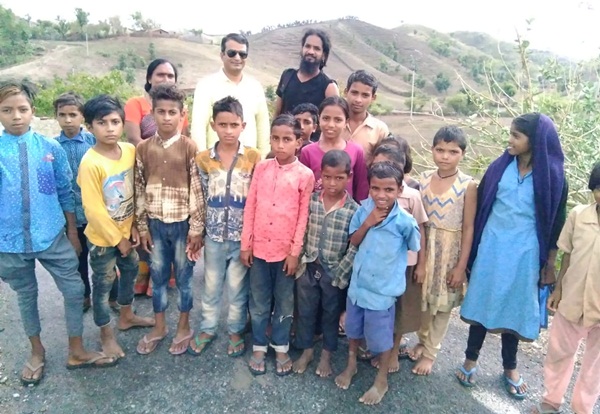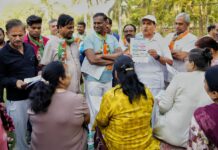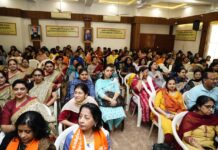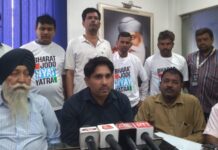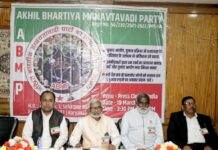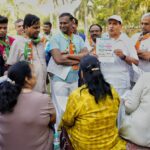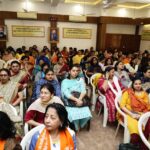Gyan Prakash
Udaypur (26 june 2019).
“Global evidence has demonstrated the importance of Early Childhood Development, highlighting that physical, cognitive, linguistic and socio emotional development of young children have direct effect on their overall development and on the adult that they become. Investing in young children is therefore key to maximize their future well-being,” says Isabelle Bardem, CFO UNICEF Rajasthan. She mentioned that “in Rajasthan, UNICEF has been supporting the government with some outreach facilitation through a civil society organization to adopt a holistic approach starting with pregnancy care and good nutrition of the mother, safe delivery, institutional as well as home-based care of the new born and young child, growth monitoring, counselling on adequate young child feeding with energy dense nutrition being key components of ECD integrated in two flagships programmes of GOI, ICDS and Poshan Abhyian. In addition, UNICEF has supported ICDS to develop quality early education through age specific engaging workbooks for children attending the Anganwadi Centre and contributed immensely to early childhood development with focus on cognitive development.” I would like to stress “that all of this approach wouldn’t be possible without the commitment of frontline workers, specifically the ANM, Asha and Anganwadi workers who are implementing key interventions and reach the most vulnerable children and their families, enhancing capacities of the parents and care givers to adequately stimulate and take care of their children.”
POSHAN 2 (IMAM) programme:
After the success of POSHAN I in 2015-16, Government of Rajasthan aimed to enroll 16,000
SAM children in the 2nd phase of POSHAN / Integrated Management of Acute Malnutrition
IMAM programme. POSHAN II was launched in October 2018 and rolling out in a phased
manner in selected 45 blocks of 20 districts. In convergence with Dept. of Health & Family
welfare, Govt. of Rajasthan, key development partners supporting phase II are Global
Alliance for Improved Nutrition (GAIN), Action Against Hunger International and UNICEF.
Nutritional status of U5 children in Rajasthan & selected 20 districts:
According to the National Family Health Survey-4 (2015-16), in Rajasthan
– 39.1% children under five years are stunted (low height-for-age <-2SD)
– 23% children are wasted (low weight-for-height <-2SD)
– 8.6 % children are severely wasted (weight-for-height <-3SD) and
– 36.7 % are underweight (low weight-for-age <-2SD).
In 20 intervention districts of Poshan II, prevalence of childhood severe wasting ranges from
5 to 16%. For all except Dhaulpur the prevalence of SAM is more than the state average
(8.6%). Dungarpur has the highest prevalence of SAM at 16%.
Programme coverage assured key of the successful:
Target for Poshan phase II and progress upto 3rd January 2019
To reach out to 16000 SAM children, block wise target of SAM children were assigned to each
development partners by the state govt.
• At the end of the month-long screening round,
17/45 blocks (38%) identified more than estimated number (≥100%) of SAM Children.
13/45 blocks (29%) identified 80-99%
08/45 blocks (18%) identified 60-79%
03/45 blocks (7%) identified 50-59%
04/45 blocks (8%) identified <30%
3.76 Lakhs
Know More:
U5 population in selected 3302 villages of 45 blocks 3.63 lakh 97% Children screened 13,274 (3.64%). Identified as SAM
10,138 (76.3%).
• A comparative analysis on Geographic spread, programme coverage & performance of
Poshan sites based on the intervention area of key development partners.
Performance analysis: UNICEF supported 7 districts:
Seven intervention districts of UNICEF have been covered in two phases. Three districts –
Udaipur, Dungarpur and Banswara in phase I and remaining four districts in Phase II. Phase
I started in October’18 and phase II in November’18. The table below shows district wise recovery and defaulter rate. In seven UNICEF supported districts around 6030 children were enrolled and 3724 children were discharged. Almost
80% children were cured within 12 weeks of the programme.
Cure Defaulter MT:
Performance analysis of IMAM programme
UNICEF (7 districts) ACF (5 districts) GAIN (8 districts) State (20 districts)


